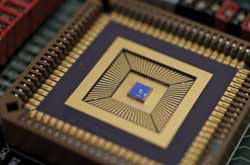Sep 8 2010
The University of Strathclyde has formed a new company called mLED, to promote its microLEDs. The new company is expected to bolster the life sciences and communications market.
The microLEDs are dense arrays of several thousand minute light sources for every square millimeter. The arrays do not need external units, such as switching matrices or optics, to modulate the pattern of light. Thus, microLEDs are more compact and efficient than other comparable technologies.
 Array of microLEDs
Array of microLEDs
The microLEDs support silicon CMOS electronic control, allowing various modulation for certain applications. This compatibility also enables utilization of integrated photodetection in optical microsystems. The microLEDs can also be used in other fields such as UV direct writing, and mask-free photolithography.
The research and development of the technology was performed at the Institute of Photonics. The researchers involved in the development were Dr. Gareth Valentine, Dr. Erdan Gu, and Martin Dawson, Director of research at the institute. The Braveheart Investment Group provided funding for the new company, with additional funding provided by Scottish Seed Fund.
Dawson stated that the microLEDs have the capacity to be modulated at a maximum of 1 GB/s per pixel data rate, in communication application. They are useful in polymer optical fiber communications, and free-space visible light communications. He added that the microLEDs are also beneficial in retinal prosthetics development, and Optogenetics research.